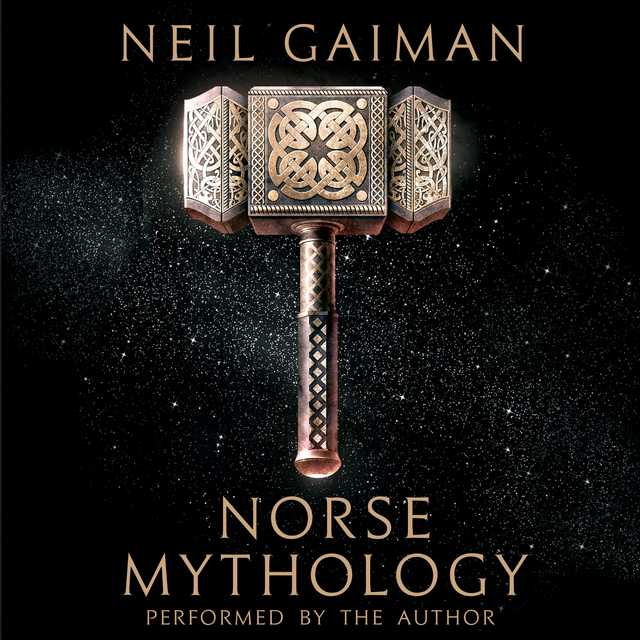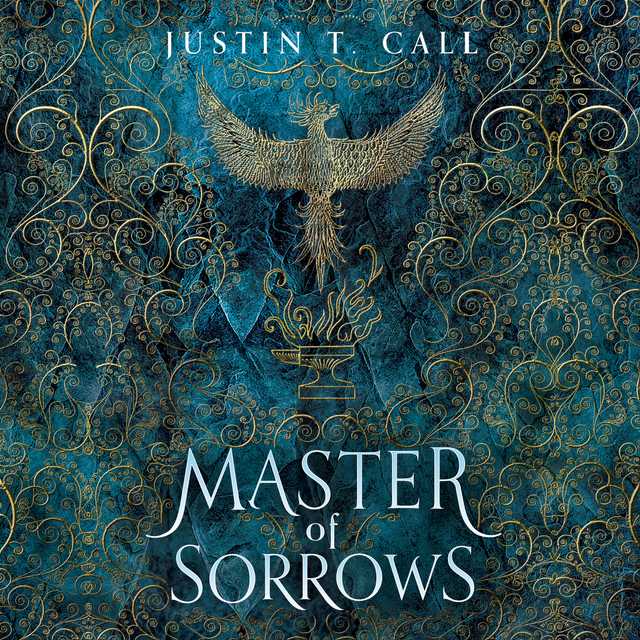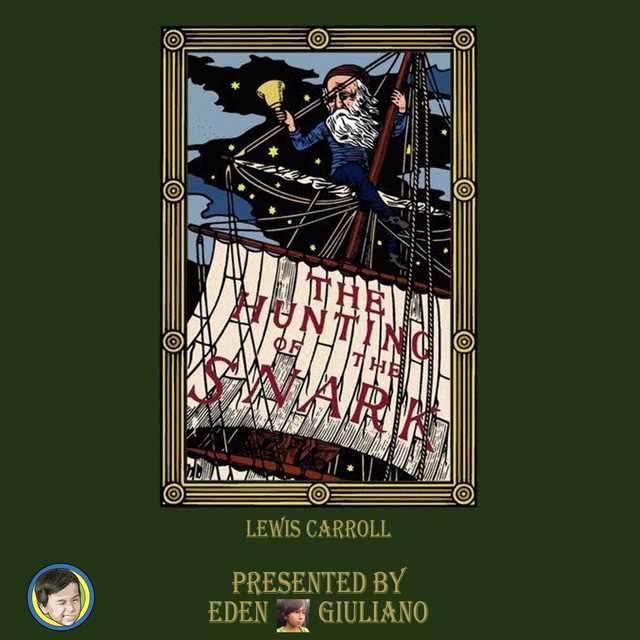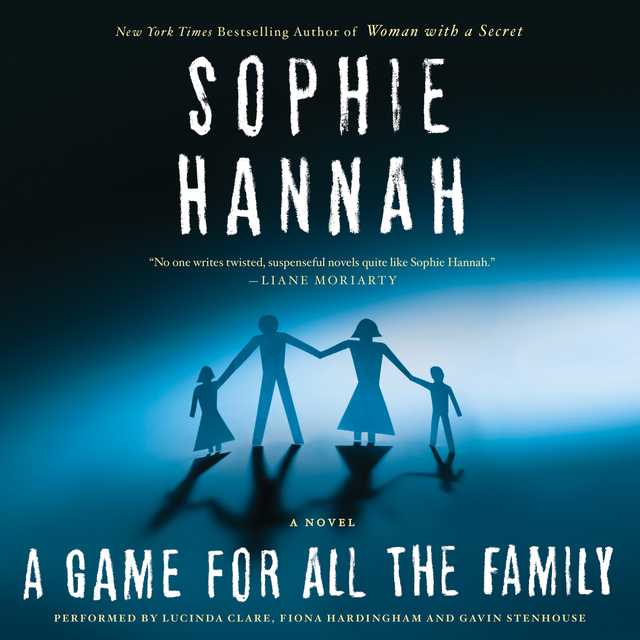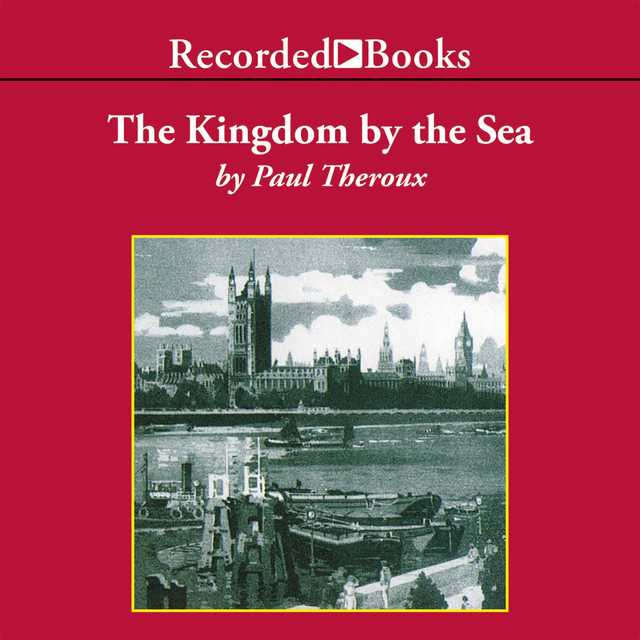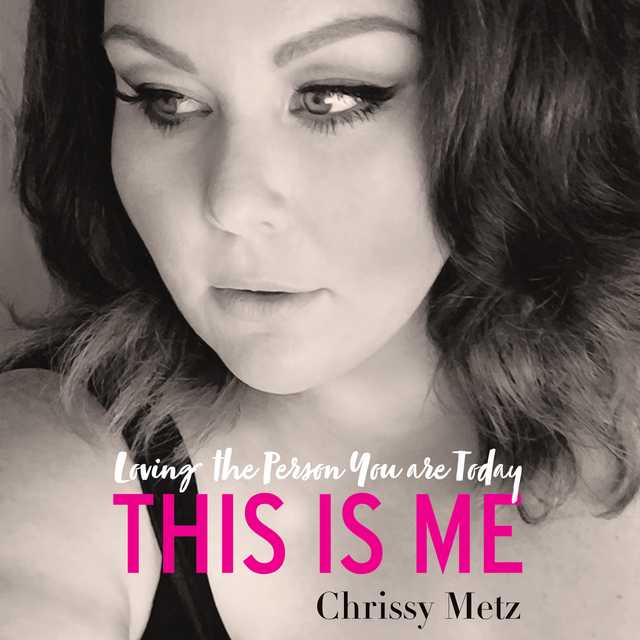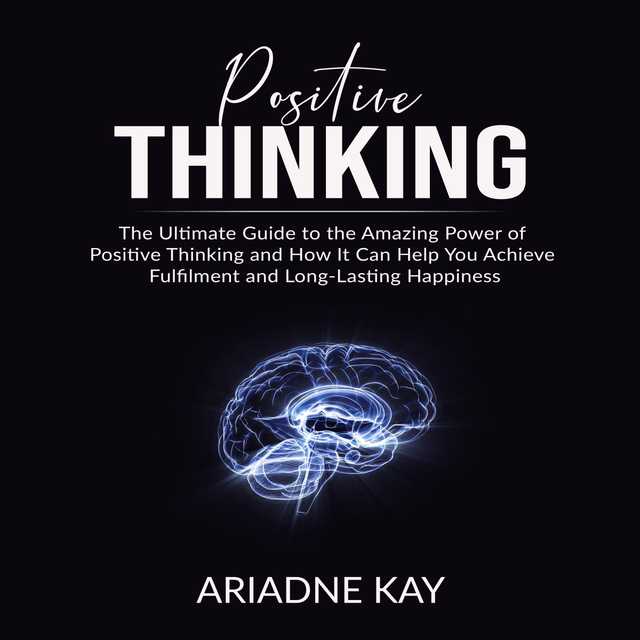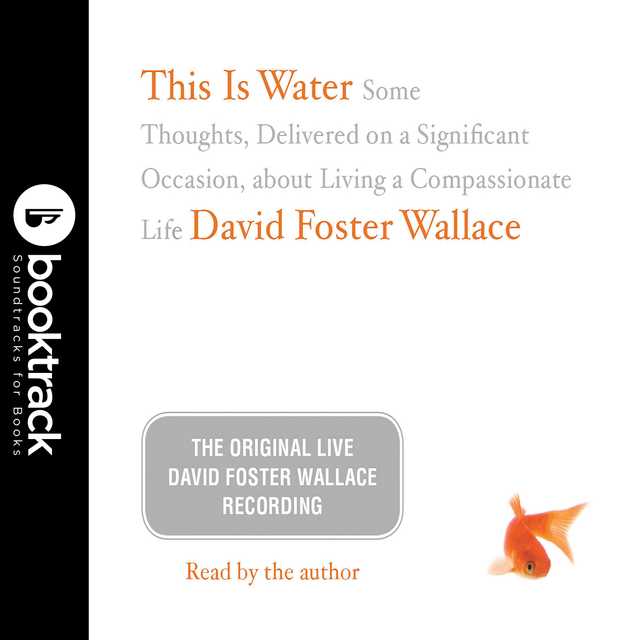Norse Mythology Audiobook Summary
Introducing an instant classic–master storyteller Neil Gaiman presents a dazzling version of the great Norse myths.
Neil Gaiman has long been inspired by ancient mythology in creating the fantastical realms of his fiction. Now he turns his attention back to the source, presenting a bravura rendition of the great northern tales. In Norse Mythology, Gaiman fashions primeval stories into a novelistic arc that begins with the genesis of the legendary nine worlds; delves into the exploits of the deities, dwarves, and giants; and culminates in Ragnarok, the twilight of the gods and the rebirth of a new time and people. Gaiman stays true to the myths while vividly reincarnating Odin, the highest of the high, wise, daring, and cunning; Thor, Odin’s son, incredibly strong yet not the wisest of gods; and Loki, the son of a giant, a trickster and unsurpassable manipulator. From Gaiman’s deft and witty prose emerges the gods with their fiercely competitive natures, their susceptibility to being duped and to dupe others, and their tendency to let passion ignite their actions, making these long-ago myths breathe pungent life again.
Supplemental enhancement PDF accompanies the audiobook.
Other Top Audiobooks
Norse Mythology Audiobook Narrator
Neil Gaiman is the narrator of Norse Mythology audiobook that was written by Neil Gaiman
Neil Gaiman is a #1 New York Times bestselling author of books for children and adults whose award-winning titles include Norse Mythology, American Gods, The Graveyard Book, Good Omens (with Terry Pratchett), Coraline, and The Sandman graphic novels. Neil Gaiman is a Goodwill Ambassador for UNHCR and Professor in the Arts at Bard College.
About the Author(s) of Norse Mythology
Neil Gaiman is the author of Norse Mythology
More From the Same
- Author : Neil Gaiman
- American Gods [TV Tie-In]
- Art Matters
- The Neil Gaiman Reader
- Chu’s Day
- Chu’s First Day of School
- Publisher : HarperAudio
- Abraham
- American Gods [TV Tie-In]
- Dead Ringer
- House of Sand and Fog
- Prey
Norse Mythology Full Details
| Narrator | Neil Gaiman |
| Length | 6 hours 29 minutes |
| Author | Neil Gaiman |
| Publisher | HarperAudio |
| Release date | February 07, 2017 |
| ISBN | 9780062663641 |
Additional info
The publisher of the Norse Mythology is HarperAudio. The imprint is HarperAudio. It is supplied by HarperAudio. The ISBN-13 is 9780062663641.
Global Availability
This book is only available in the United States.
Goodreads Reviews
Sean Barrs
April 28, 2020
Gaiman is, without a doubt, one of the most multi-talented writers alive today. I don’t say this out of a sense of personal bias, but with a degree of objectivity. Not only does he write fantastic comics, intelligent children’s stories and detailed novels about the nature of godhood (even if I didn’t personally enjoy them all), he also has adapted Norse mythology and re-written it with his modern stylish flair. He really is a talented man; he is capable of that rare, rare, thing of being able to write fiction that is worthy of literary criticism but is also ridiculously popular and, well, just plain cool. He has many years of writing ahead of him (I hope.) And I don’t think it is too far a thing to suggest that he may win the noble prize for literature in his lifetime. He has contributed much to the arts, and this work here shows he has much more to give. I think he really deserves it. So here he has retold some already excellent stories. In doing so he makes them approachable and, perhaps even, more engaging for a reader today. I do like old poetry, though not everyone does. I think this can be taken as either an introduction to such works or simply as it is at face value. And it really is what it says on the cover: it’s a whole bunch or Norse stories about some familiar faces. We have Odin, conniving and powerful. We have Thor, strong and honourable. And we have Loki, cunning and ingenious with his own complex intentions. They do battle with each other, with the elements and a whole host of nasties. But not before Gaiman takes the time to provide you with guided tour of Yggdrasil and the nine worlds that take root from her. He clearly establishes the confounds of this mythology before he even begins. The collection ends with the most appropriate tale of them all, Ragnarok: the final destiny of the gods. It spends the entirety of the collection building up to it:“Until now I have told you of things that have happened in the past- things that happened a long time ago. Now I shall tell you of the days to come”Thus we witness the end of time. The gods fight in one final glorious battle. Loki, naturally, does not fight with the gods of Asgard. Instead he leads the armies of the dead against them. Many of the gods will die, and the pattern will begin anew as their offspring pick up the weapons of their slain forbears; ultimately, taking on their mantels. The cycle continues, as Gaiman captures the heart of Norse mythology here. What I also noticed is how these tales have affected his other works. Sure, the characters are different; yes, the setting is warped into something else, but you can clearly see how writing this, and researching this, has oozed out into his other projects. This ideas of rejuvenation is repeated in the Sandman series, for example. Gaiman also narrates his personal journey in the introduction; this book has been a long time coming: this topic has clearly helped to propel much of his writing, and it really is worth hearing about.___________________________________You can connect with me on social media via My Linktree.__________________________________
Emily May
August 29, 2017
I've always loved mythology, folktales and legends. They are the original fairy tales of humanity and, given the timeless fairytale quality to Gaiman's writing, it seemed to follow that he would be the perfect writer for a book of Norse mythology. He is. In fact, Gaiman seems born to write (or rewrite) myths.Norse mythology is actually one I've always been less familiar with. I know Greek, Roman and Egyptian fairly well, and some Indian as well, but my knowledge of Norse mythology kind of ends at Odin, Loki, Thor and Thor's hammer. And even then I don't know much about what they all did. To me, this book was very interesting and informative as well as a compelling pageturner.Gaiman recreates Norse myths in his signature style, with a bit of humour, a whole bunch of complex characters, and a big serving of charm. He makes the stories feel modern and fresh, yet still timeless. You feel like you're reading about millennia-old gods, but it's very accessible to today's reader.Norse Mythology is told in short stories. Some of the chapters are very short - only a page or two long - and others are slightly longer. I liked how easy it was to dip in and out of. I could go read some of my other books between stories and return to this without a problem. I know ease of reading should not be a top priority, but it is great to find a book that makes experiencing its stories as easy and non-demanding as possible.It is fast-paced and action-packed, but what shines through most of all is how all these stories tie into important aspects of the real world - as stories about gods tend to do. This is a fascinating portrait of a time and a people who really truly believed in Odin and Loki and their many escapades. It's funny, it's eye-opening, and it's very enjoyable. Blog | Facebook | Twitter | Instagram | Youtube
Bradley
February 15, 2017
Definitely short, but imminently readable. This is one of the best straight mythology books I've read when it comes to pure enjoyment. I say this, fully aware that I'm a Gaiman fanboy, and yet, I still mean it. :)Don't look for fiction here. Rather, look for the source material and a clear understanding of the Norse mythos as far as we have it. So much has been lost and then, there's a ton of fragments. Alas. But what we do have is quite cool.My personal favorite was the story of Baldur's murder and the attempt to raise him up from Hel's domain. Hel even agrees, graciously, to let him come back from the dead as long as not a single person on any level of the World Tree refuses to weep for the man. Baldur is a sweet man that makes the flowers grow, for goodness sake... and it was a very close race... but you know how these things go.We all know that LOKI is the reason we can't have nice things. Forget children. I blame Loki. :)I love the fact that wits and brawn are held in equal esteem, but I sure wish there was a lot more stories about the women. There's plenty of hints. Just lost fragments, however. It's a shame.Still, what we've got is enough to whet anyone's appetite and I even think this is a perfectly appropriate text for young ones, too. I definitely plan on reading it to my kid once she holds still long enough for it. :) It'll be a nice companion to the The Kalevala and some Greek stuff, too. :)Go Fenrir! (I'd really love to see Cthulhu go up against him.)
Mario the lone bookwolf
February 21, 2023
Retelling and thereby pimping the original stuff Like rarely someone except Gaiman couldHis talent is incredible and extra fueled by his love for the material, so there´s simply no alternative if one is a mythology nerd. It´s also an example of the fact that Ancient storytelling often fails in comparison with rebootsThat´s kind of unfair too, because they invented storytelling and each nowadays author has several advantages. The millennia that passed and the works that have since been created to get inspiration from and steal everything that isn´t approved Loki safe standard, but especially the fact that creative writing can be learned, not to mention the importance of tvtropes. Or maybe modern writers just thereby subconsciously compensate for the fact that most stories have already been told and that there just can be New interpretations of the gold standardsLet´s face it, we´re kind of always reading the same fantasy, sci fi, and horror tropes in different constellations, but it´s still always a hell of a ride. Especially if someone like Gaiman is so nice to tell us stories we should already be bored of. But instead of repeating one more round until boredom kicks in, he raises the level of how rousing a story can be and burns clearer pictures in our collective memory. And there are still hidden mythology treasures from all around the world to be exploredJust as with the famous, mostly European, tales, their extra layer of ancient storytelling stylistics could be polished to make them more attractive to modern audiences. The sheer potential is immense and could lead to a similar avalanche of fictional stories inspired by them.Tropes show how literature is conceptualized and created and which mixture of elements makes works and genres unique: https://tvtropes.org/pmwiki/pmwiki.ph...
Virginia Ronan
November 24, 2018
“Of course it was Loki. It’s always Loki.”If you ask me this quote is a sufficient summary of the entirety of Norse mythology. *lol* But no one asked me so I’m going to continue to write down a few of my other thoughts. ;-P - I wish I could have read this before I read Uncle Rick’s “Magnus Chase series” because there were all the details I wanted to know while I read those first two books. XD Also it’s kinda funny that Uncle Rick managed to write some of those stories into the plot of his books. ;-) - Thor is definitely not the brightest bulb in the chandelier. *lol*- What’s with all those giants and other gods that want to marry Freya?! O_o I mean what is she? A honeypot for bears?! XD They all want to buy a pig in a poke and don’t even know about her fierce temper. Haha! Poor Freya always reduced to her good looks. Guess this game is as old as time. *shakes head*- Why are all the giants ugly except of some of the women?! *lol* I mean there were gods (Loki, Frey) who had a relationship with or married a giantess and they obviously were beautiful, so I don’t really get why the rest of them (even their parents) look the way they do. The ugliness skipped a generation? *lol*- Why didn’t Balder and Freya start dating? They would have made the perfect children. ;-P”Loki was handsome, and he knew it. People wanted to like him, they wanted to believe him, but he was undependable and self-centred at best, mischievous or evil at worst.”- It was nice to hear more about Loki’s family even though I feel sorry for Sigyn. I mean he obviously cheated on her or his three kids with the giantess wouldn’t have even existed, yet she’s still faithful and stands next to him trying to safe him from the poison of the snake. Sigyn deserves everything and the world for this!
Katerina
January 12, 2018
In the beginning, there was nothing but mist and flames.At least, that's what the Edda claims.I've always been fascinated with Norse Mythology (and with everything ancient in general). With its strong impact on Marvel's movies, metal music and J.R.R. Tolkien, the AllFather of high fantasy, references to the mighty Gods of Asgard, and the impending twilight thereof, are a part of daily life. Neil Gaiman did not invent a story from the start. He had the material, the facts, the descriptions ready. Yet Norse Mythology is the stellar proof of his tremendous talent and ingenuity, because like a new Odin, he instilled breath in myths existing for thousands of years, he commanded to life frost giants, demons, dwarves, elves, Æsir and Vanir alike, and crafted a marvelous collection of stories, ideal to read them in a cold winter's night, next to a grinding fire, holding a cup of warm content, while your mind travels in wild landscapes and flies in the form of a raven, spying the creation of the world and its destruction, only to be reborn again. For in Norse Mythology, it is obvious that rebirth always follows death. “Behind the depth, before the heightSurrounded by the serpent JörmundgandWorld of man in the middleOf heat and ice built by the Ymer brow” One of the most astonishing things you realise while reading Norse Mythology, is that human minds work in a similar manner all over the world. You can't help but notice the similarities with other mythologies, the traditions of people who thrived miles away. Take the creation of the Nine Worlds for example: there was a flood, one created by Ymer's blood, that destroyed all life only to start it anew. You will notice the same pattern in Greek Mythology, with Deucalion and Pyrrha, in Genesis, with Noah's ark, and many other cultures, like the Aboriginal tribes and the Mayas. You will also discover the origins of the Middle Earth's creation, and the races inhabiting it, and you'll marvel at the parallels between Gjallerhorn, which will be blown by Heimdall at the end of all things to wake the Gods, and the Horn of Valere which will summon the Heroes to battle in Tarmon Gai'don, the Final Battle, in Robert Jordan's Wheel of Time. It's chilling, and strangely satisfying.Odin, Thor and Loki are the main dramatis personae, followed by Freyr and Freya, Baldr and Týr. Through Neil Gaiman's eyes, his witty narration infused with humour, subtle comments and foreboding, you witness Odin's quest for wisdom, and the price he had to pay to acquire it; you will find out how Loki made Sif go bald, and thus the greatest treasures came to the possesion of the Gods; you will follow a strange man's efforts to create the walls of Asgard, demanding to be paid with the sun, the moon and beautiful Freya. “FrøyaBlue her eyesGold of hairA maiden so fair” You will shiver before the children of Loki, the serpent of Midgard, the lady of the realm of the Dead, and wolf Fenrir, the demise of the Gods. “I watched as he shoutedTo the giants who died that dayHe held up his hammer highAnd called to Odin for a sign” You will laugh at Thor's disguise in order to take back Mjolnir, and taste the heavenly mead of Poetry and Widsom, which was made of blood; you'll visit the land of the giants alongside Thor and Loki and you'll be tricked by illusions; you'll search for the apples of Iðunn which grant eternal youth (apples of Hesperides anyone?) after the Gods lost them thanks to Loki; you'll see Freyr finding his missing part; you will steal the cauldron that brews the greatest beer; and you will mourn the death of the Sun. “Honour your brother's name, unarmed or blindLet me aid you in your aim, don't stay behind Let's maim immortality and death to a deity” You will find out how the first fishing net was created and why, and finally, you will freeze in the Coldest Winter, the prelude to the extinction of mankind, and the Twilight of the Gods.Ragnarök. “RagnarökSee the earth go up in flamesRagnarökThe great serpent writhes in rageThe doom of gods now hath comeThe fall of the sunThe gates of Hel devour the deadAt the twilight of the gods” Neil Gaiman's pantheon is ruled by the same passions, desires and ambitions with the mortals. His Gods are naive and cruel, spontaneous and bloodthirsty; Thor is not particularly bright (nor as hot as Chris Hemsworth), and Loki is a spiteful creature, a puppeteer, a troublemaker and by the end, you'll crave his suffering. “Asgard's always been my homeBut I'm of different bloodI will overthrow the throneDeceiver!Deceiver of the gods!” Norse Mythology may not be original in its content, but it is innovative and deeply inspiring in its prose, and the blessed talent of the hand that wrote it. It is a quick and relaxing read I highly recommend if you're searching for your next epic adventure! “Thor! Odin's sonProtector of mankindRide to meet your fateYour destiny awaits” *Buddy read with Eliasdgian* Playlist (in order of lyrics' appearance) Midgard - Therion Frøya's Theme - Leave's Eyes Thor - Manowar Brother's Bane - Týr Ragnarök - Stormwarrior Deceiver of the Gods - Amon Amarth Twilight of the Thunder God - Sabaton (Amon Amarth cover)
Tharindu
June 21, 2022
"I am grim of mind and wrathful of spirit and I have no desire to be nice to anyone." I cannot say Norse is my favorite area for mythology, especially compared to the Greek, but Gaiman does a pretty good job here to get one interested in the Norse. In fact, I believe this is an excellent way to start your Norse journey.I'm sure majority of the mythology fans probably had read Stephen Fry's Mythos, and if you had done so, this is going to be a lot familiar: A collection of small stories but shares an underlying plot that only gets attention during last chapter. Well, may not be as humorous as Fry's work, but good enough to keep one entertained. 3.5-stars. "That is the end. But there is also what will come after the end...From the gray waters of the ocean, the green earth will arise once more...And the game begins anew."
Val ⚓️ Shameless Handmaiden ⚓️
December 15, 2021
I love mythology and I’m pretty sure Norse mythology is my favorite of them all. This was such a digestible way to review such great stories. I want more.
Jeffrey
November 12, 2020
”The Norse myths are the myths of a chilly place, with long, long winter nights and endless summer days, myths of a people who did not entirely trust or even like their gods, although they respected and feared them. As best we can tell, the gods of Asgard came from Germany, spread into Scandinavia, and then out into the parts of the world dominated by the Vikings…. In English, the gods have left their names in our days of the week. You can find Tyr the one-handed (Odin’s son), Odin, Thor and Frig, the queen of the gods, in respectively, Tuesday, Wednesday, Thursday, and Friday.”Christianity very nearly drove the old gods of the Northmen from the face of the Earth. There was something so tangible about the pagan gods. They had personalities, fallacies, and a sense of humor that didn’t always bode well for their human worshippers. If we learned that Loki, in particular, had taken an interest in our troubles, we felt more trepidation than relief. His cunning intelligence was more often used for creating mayhem than it was providing solutions to dire problems. He was the gasoline that turned a smoldering, warm, ash heap into a raging forest fire. Loki made enemies of everyone, which was why he had to live in a house with four doors facing each direction. He was the instigator of much of the troubles the gods found themselves facing, but he was also the one who always brilliantly conceived a plan that saved them from those troubles. Was Loki more of an asset or a liability? You will have to decide that for yourself. I do know that finding out he was not on the side of the gods in the final battle, Ragnarok, made me tremble with concern for the gods. Who didn’t want Thor on their side? He wasn’t the brightness bulb in a chandelier, but once he entered a fight, one side breathed a sigh of relief, and the other side started fleeing for their lives. His magic belt, Megingjord, doubled his strength, but it was his hammer, Mjollnir, that made Giants, Trolls, and other gods tremble. The great, recently departed, Stan Lee mined the Old Norse tales heavily for his writing. These Norse gods were superheroes long before the term ever existed. What would we give up to have all the wisdom of the world? Odin gave up an eye. He even plucked it from his head with his own fingers. He was the god of the gods and, according to legend, the father of us all. ”Because he was the father of the gods, and because he breathed the breath of life into our grandparents’ grandparents’ grandparents. Whether we are gods or mortals, Odin is the father of us all.”How about this for creepy? The Death Ship, Naglfar, was made from the untrimmed fingernails of the dead. A friend of mine was once moved into a different office where he worked. He kept finding fingernail clippings in drawers, in between stacks of paper, under the desk legs, wedged behind the computer speakers, snagged in the carpet fibers. Every time he would clean a new section of his office, he would find piles of fingernail clippings to sweep up. This was all very creepy for him, but when I told him that the man those clippings belonged to had recently died, he nearly came out of his skin. Suddenly, those annoying nail clippings became eerie reminders of mortality. Speaking of mortality: ”When the gods felt age beginning to touch them, to frost their hair or ache their joints, then they would go to Idunn. She would open her box and allow the god or goddess to eat a single apple. As they ate it, their youth and power would return to them. Without Idunn’s apples, the gods would scarcely be gods…” I don’t know about the rest of you, but I could use a bite of those Golden Apples. I’m not even greedy; just a nibble would be great. Even the mighty Thor could be temporarily flummoxed. ”There was a giantess in the kitchen, cutting up onions as big as boulders and cabbages the size of boats. Thor could not help staring: the old woman had nine hundred heads, each head uglier and more terrifying than the last. He took a step backward.” If you were fighting a monster like this, where would you start and where would you end? The stories that Neil Gaiman gathered together here were based on what little was left of the pagan stories of the Norse gods. Fortunately, a 13th century Icelandic saga writer named Snorri Sturluson recorded these tales in his book Prose Edda. Neil Gaiman retold them with his entertaining and illuminating prose. Check out the life of Snorri Sturluson when you get the chance. He might have written about heroes of old, but his life was equally fascinating to read about. What stories we have were the tip of the iceberg of the stories that were originally told. Wouldn’t it be great if more of them were found? The Norse gods were mere shadows of what they were in the past. This was a wonderful introduction to Norse Mythology. If you know very little about the old gods, this would be a great place to start. If you have some idea of the Norse legends, you would certainly benefit from reading them in Gaiman’s engaging style. I even found myself chuckling at several points...that Loki kills me every time. If you wish to see more of my most recent book and movie reviews, visit http://www.jeffreykeeten.comI also have a Facebook blogger page at:https://www.facebook.com/JeffreyKeeten
Leonard
January 17, 2021
Eight centuries ago, Snorri Sturluson, one of Iceland’s greatest literary glories, wrote the Prose Edda, a significant source for what is left of the ancient religion of the Vikings, with a medieval Christianity twist. Only recently, Neil Gaiman, one of Britain’s most celebrated literary glories, wrote this Norse Mythology, a blockbuster retelling of the ancient religion of the Vikings, with a Marvel superhero twist.While it is not always easy to wrap one’s head around Snorri’s prose, Gaiman’s book is delightful and readable, almost a children’s digest of these arcane myths of pre-Christian Scandinavia. The colourful tales flow naturally under Gaiman’s pen as if they were a collection of Grimm’s fairytales or Lancelyn Green’s recounting of the Arthurian legends.Gaiman addresses the reader as if he were a skald speaking to an audience gathered around a campfire under a field of chilly stars. He starts with the dismemberment of the cosmic Ymir at the beginning of times. He leads us through the various adventures of the gods of Asgard, particularly Odin, Thor and Loki, against different kinds of cave-dwarfs and frost-giants, all the way to the last battle of Ragnarök, at the end of days. I particularly love the stories that involve this most unlikely duo, the coarse and invincible Thor and the devious and shapeshifting Loki. Some of their adventures, for instance, their encounter with the Brobdingnagian Skrymir/Utgardaloki, are fascinating; others, like Thor’s wedding with the ogre Thrym, are priceless. Gaiman’s description of Ragnarök is both sublime and sinister: indubitably the best section of the whole book.However, while Snorri Sturluson went on to tell the stories of the hero Sigurd, Gaiman restricts himself to the narratives concerning the gods. Therefore, you will not find a word in his book about the heroic Norsemen — historical or legendary — who are mentioned in Snorri’s Heimskringla, in Saxo’s Gesta Danorums (the source of Shakespeare’s Hamlet), in the Völsunga Saga, or the Nibelungenlied.Naturally, these myths, which had been stifled under Christian domination, resurfaced in the 19th century with Richard Wagner’s Ring des Nibelungen, and in the 20th century with J. R. R. Tolkien — the Silmarillion is a fascinating variation on the Norse myths. More recently, G. R. R. Martin borrowed quite a few themes from these old myths in his A Song of Ice and Fire, and there are now literally piles of YA novels that giddily, and maybe unwittingly, loot and misrepresent Snorri’s legacy. However, Gaiman’s book is an honest, faithful, engaging and robust endeavour to make it shine yet again.
Paul
March 21, 2017
What a fantastic retelling of Norse Myths. Featuring such characters as Odin, Thor and Loki along with a host of other lesser known gods and characters. Gaiman does his best to stick to the source material and not stray too far from the myths themselves, writing it in his own language which really brings the stories to life. By doing this, Gaiman has written the perfect place to start if you want to learn more about Norse Mythology in my view. What really added to my enjoyment was that I had read the Poetic Edda before this, so I had an inclination as to which myths would get the Gaiman treatment. It’s basically a collection of short stories, with a large Ragnarok story at the end. Amongst my favourites were:• How Thor receives Mjollnir (Treasures of the Gods)• When Thor has to dress up as a bride to get Mjollnir back (Freya’s unusual wedding)• The story of the cauldron the Gods want so they can get drunk a lot (Hymir and Thor’s fishing expedition)• The mead of Poetry (Mead of poets)My favourite though, was Thor’s journey to the land of the giants. It’s one of the longer tales in the book where Thor and his companions are put through their paces in a number of physical contests. Gaiman stays true to how the characters are described within the ancient myths. The characters are different to what people have come to expect from Marvel films. Thor is a bit of a dumb meat head. Odin is treacherous and ultimately clever. Loki is even more conniving than the film/comic book version. Gaiman starts the book by saying that Norse myths are his favourites, and this shows with the level of care he gives the source material whilst adding his own spin to the tales. Norsemen also play a large part in American Gods. I listened to this on audiobook and Gaiman’s narration is great. Something really special happens when writers narrate their own works. The passion comes across when they read their own works. I’d recommend any of Gaiman’s audiobooks. Final thoughtGaiman has definitely drank from Odin’s Gift (from the nice end!) and this is a must-read for anyone interested in Norse / Viking history. I already want to reread this, it was that good and it’s short enough to be read in a couple of days.
Ahmed
April 07, 2017
**Spoiler Free Review** There is no glory without danger Before beginning the review, I clear out that I read this book as a fictional work not as the work which I believe can be/is true. I am telling you because this book was getting little serious about narrating these myths. Like trying to make us believe these are real facts. Now, the actual review: This book is the re-writing of Norse Mythology. Author doesn't exaggerate the facts. He simply re-writes some of the popular myths in pretty straight-forward way. I really liked the writing style. Most of the myths are about Odin, Thor and Loki. In the whole fifteen myths, I just loved four:=> The Children of Loki=>Freya's Unusual Wedding [this is hilarious]=>Thor's Journey to the Land's of Giants [this myth has some great universal truths]=> The Treasures of gods [if you wanna know how Thor got his Hammer, read it]These are those which I enjoyed the most. Other than these were just fine. Some of them I liked as a fiction. Some of them I didn't even like as a fiction. I liked Loki. He was clever. Evil. Cause of every bad deed. But he was little good too. I couldn't decide whether he was completely good or completely bad. Thor was also good. I liked reading his myths too. I couldn't like Odin that much. He was just fine.After reading this book, I wouldn't recommend this book to children. Even though this book is totally fine for them. But still I won't be recommending this to them. I hope some of you have gotten an idea why I am saying this. Believe me this book is totally fine for them. But I am not feeling that they should read this book. Of course when they will have grown-up then there is no harm.Or the most important thing I almost forgot to tell you that this was my first Mythology reading. I thought these were just like our regular fantasy genre. But now I think that there is a great joy in reading myths as a part of books' plot. Like Rick Reordan's books. Rather than reading the original myths. Don't get me wrong, please!Nevertheless, this book is good. Highly recommended for those who love reading original myths. But not for children until their mature age.☆☆3.5 Stars☆☆ When something goes wrong, the first thing I always think is, it is Loki’s fault. It saves a lot of time -- ThorApril 5, 2017
Peter
January 24, 2020
If you never read Northern mythologies before or only heard about the Northern Pantheon by a Marvel movie (the author refers to them in his introduction) this is certainly the book to get a good entry into that world. Neil Gaiman professionally introduces in a modern and fluent narrative what it is about and who the main players are. You come to know why Thor once dressed up as a woman, learn where poetry does come from and wonder about the timeless wisdom that no one can beat old age. Packed chapters tell of Thor, Thyr, Odin, Loki and their adventures. You see how the world was structured back then and what was good or evil. My favourites were the death of Balder, the last days of Loki and the apocalyptic Ragnarok, the final destiny and destruction of the Gods. The end of the old times. Well, so far so good. Was there anything new to Northern Mythology as I read it way back in my childhood and youth? Unfortunately not too much. Certainly a good book if you want to have some more background to a Marvel movie or comic but not sufficient for the experienced Mythologist. It's easy to read though and brought back some memories of the old stories. A good basic work, a fine cover and a quick read. But don't expect any new aspects.
Ahmad
May 07, 2022
Norse Mythology, Neil GaimanNorse Mythology is a 2017 book by Neil Gaiman. The book is Gaiman's retelling of several stories from Norse mythology. These stories include the theft of Thor's hammer, the binding of Fenrir and other tales about the Aesir. In Norse Mythology, Gaiman stays true to the myths in envisioning the major Norse pantheon: Odin, the highest of the high, wise, daring, and cunning; Thor, Odin’s son, incredibly strong yet not the wisest of gods; and Loki—son of a giant—blood brother to Odin and a trickster and unsurpassable manipulator.عنوانهای چاپ شده در ایران: «اساطیر نورس (نورسه)»؛ «داستانهای کهن اسکاندیناوی»؛ نویسنده: نیل گیمن؛ تاریخ نخستین خوانش: روز بیست و چهارم ماه ژوئن سال2019میلادیعنوان: اساطیر نورس (نورسه)؛ نویسنده: نیل گیمن؛ مترجم: رحیم قاسمیان؛ ویراستار: فرزاد فربد؛ تهران: انتشارات پریان، سال1397؛ در288ص؛ شابک9786007058589؛ موضوع: اساطیر اسکاندینای از نویسندگان بریتانیا - سده21معنوان: داستانهای کهن اسکاندیناوی؛ نویسنده: نیل گیمن؛ مترجم: جواد همایونپور؛ سبزوار: انتشارات یوبان، سال1397؛ در270ص؛ شابک9786008349396؛کتاب «داستانهای کهن اسکاندیناوی»، اثری نوشته ی «نیل گیمن» است، که نخستین بار در سال2017میلادی، به چاپ رسید؛ «نیل گیمن» که مدتها از اساطیر کهن، برای آفرینش دنیاهای شگفت انگیز داستانهای خویش الهام گرفته، در این کتاب به پرداختی نوین از «خدایان نورس»، و ریشه ها و داستانهای مربوط به آنها دست زده اند؛ «گیمن» در این کتاب «داستانهای کهن اسکاندیناوی»، با وفاداری ویژه، از خدایان چندگانه ی «نورس» سخن میگویند؛ از: «اودین، خدای خدایان، که خردمند، جسور و زیرک است»؛ «ثور، پسر اودین که بی نهایت قدرتمند است اما باهوشترینِ خدایان به حساب نمیآید»؛ و «لوکی، برادر خونی اودین و شخصیتی حیله گر و فوق العاده فرصت طلب»؛ «گیمن» با نثر دل انگیز و هیجانی خود به داستانهای افسانه ای این خدایان میپردازند، و به آنها، با همه ی پیچیدگیها و ظرافتهای شخصیتیشان، جانی دوباره میبخشند؛ اسطوره های «اسکاندیناوی»، اسطوره های سرزمینهای سرد هستند، با شبهای زمستانی بسیار بلند، و روزهای تابستانی بی پایان، اسطوره های مردمانی که هرگزی کاملا به کسی، حتی به ایزدان خودشان باور نمیکردند، اگرچه از ایزدان میترسیدند، و به آنها احترام میگذاشتند؛ به گمان این فراموشکار ایزدان «آسگارد» از «آلمان» آمدند، و در «اسکاندیناوی» گسترش یافتند، و سپس به بخشهایی از جهان، که «وایکینگها» تصرف کردند، راه یافتند، به جزیره ی «اورکنی اسکاتلند»، و سرزمین «اسکاتلند»، «ایرلند»، و به شمال «انگلستان»، جاییکه این مهاجمان بخشهایی از سرزمینشان را با نامهای ایزدان خویش «ادین» و «تور» همنام کردندتاریخ بهنگام رسانی 23/03/1399هجری خورشیدی؛ 17/02/1401هجری خورشیدی؛ ا. شربیانی
Magrat
June 12, 2018
Igual es un poco loco darle 5 ESTRELLAZAS a este libro pero es que lo he disfrutado DEMASIADO.Este volumen es una manera genial de introducirse en los mitos nórdicos contados de manera super entretenida, ligera, divertida y al mismo tiempo informativa.Igual influye que amo la mitología nórdica y que amo a Gaiman, pero el caso es que ha sido una lectura de 10 para mi. ¿Dónde hay que votar para que Gaiman escriba más libros sobre leyendas y mitología?#LOKIFOREVAH
Most Popular Audiobooks
Frequently asked questions
Listening to audiobooks not only easy, it is also very convenient. You can listen to audiobooks on almost every device. From your laptop to your smart phone or even a smart speaker like Apple HomePod or even Alexa. Here’s how you can get started listening to audiobooks.
- 1. Download your favorite audiobook app such as Speechify.
- 2. Sign up for an account.
- 3. Browse the library for the best audiobooks and select the first one for free
- 4. Download the audiobook file to your device
- 5. Open the Speechify audiobook app and select the audiobook you want to listen to.
- 6. Adjust the playback speed and other settings to your preference.
- 7. Press play and enjoy!
While you can listen to the bestsellers on almost any device, and preferences may vary, generally smart phones are offer the most convenience factor. You could be working out, grocery shopping, or even watching your dog in the dog park on a Saturday morning.
However, most audiobook apps work across multiple devices so you can pick up that riveting new Stephen King book you started at the dog park, back on your laptop when you get back home.
Speechify is one of the best apps for audiobooks. The pricing structure is the most competitive in the market and the app is easy to use. It features the best sellers and award winning authors. Listen to your favorite books or discover new ones and listen to real voice actors read to you. Getting started is easy, the first book is free.
Research showcasing the brain health benefits of reading on a regular basis is wide-ranging and undeniable. However, research comparing the benefits of reading vs listening is much more sparse. According to professor of psychology and author Dr. Kristen Willeumier, though, there is good reason to believe that the reading experience provided by audiobooks offers many of the same brain benefits as reading a physical book.
Audiobooks are recordings of books that are read aloud by a professional voice actor. The recordings are typically available for purchase and download in digital formats such as MP3, WMA, or AAC. They can also be streamed from online services like Speechify, Audible, AppleBooks, or Spotify.
You simply download the app onto your smart phone, create your account, and in Speechify, you can choose your first book, from our vast library of best-sellers and classics, to read for free.
Audiobooks, like real books can add up over time. Here’s where you can listen to audiobooks for free. Speechify let’s you read your first best seller for free. Apart from that, we have a vast selection of free audiobooks that you can enjoy. Get the same rich experience no matter if the book was free or not.
It depends. Yes, there are free audiobooks and paid audiobooks. Speechify offers a blend of both!
It varies. The easiest way depends on a few things. The app and service you use, which device, and platform. Speechify is the easiest way to listen to audiobooks. Downloading the app is quick. It is not a large app and does not eat up space on your iPhone or Android device.
Listening to audiobooks on your smart phone, with Speechify, is the easiest way to listen to audiobooks.

